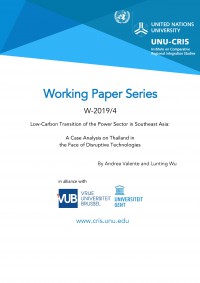Low-Carbon Transition of the Power Sector in Southeast Asia: A Case Analysis on Thailand in the Face of Disruptive Technologies

In understanding the low-carbon transition dynamics of the power sector, this paper draws upon two separate strands of existing literature, namely the mainstream sustainability transition theory — multilevel perspective (MLP) approach — and the canonical disruptive innovation paradigms. It is observed that the former doctrine follows a holistic pattern that maps out general conditions under which transition is to occur, but is overly deterministic and falls short of contemplation on actors themselves; by contrast, the latter is actor-based and investigates locally their responses towards disruptive technologies, but has been mainly applied in the context of business strategy research. In this regard, the particularity of the power sector in Southeast Asian countries, wherein the state-owned power utility falls under the category of both a sociotechnical regime through the lens of MLP approach and technological incumbents through the prism of disruptive innovation paradigm, may link these two literatures together. Acknowledging the sociotechnical nature of technological transformation which is a non-linear process, this article suggests three dimensions to evaluate whether a country’s power sector is undergoing low-carbon transition: reconfiguration within the incumbent power regime, business model transformation, and the evolving regime-niche relationship. A case analysis is performed on Thailand against the proposed framework, and it is concluded that the Thai power sector is indeed undergoing a low-carbon transition. However, Thailand’s progress may not be similarly discerned in other Southeast Asian countries, which offers a fertile ground for future research on the power sector of those countries and on the possible reasons why they demonstrate different levels of low-carbon transition.
